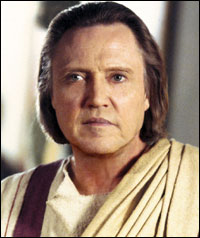Caesar
6:30 p.m. Thurs., June 12 at Egyptian
TNT’s coming two-part miniseries epic holds your attention the way any small-screen, historical soaper should if it’s going to keep people away from the remote. Director Uli Edel (Last Exit to Brooklyn) has such a brisk hand with this materialwhich traces the evolution of the Roman leader’s intellect and ambitionthat even the cheesy, drippy stuff (i.e., the requisite love scenes) isn’t allowed to get too soggy. Lead Jeremy Sisto, a former miniseries Jesus, is a handsome actor with the gravity to make plausible what seems here to be a rather swift climb to power (he hears his first “Hail, Caesar!” at about the 45-minute mark), though Julius isn’t half as interesting as the melodrama provided by everyone else. The late Richard Harris, sadly, dies a half-hour into the show. Deliciously playing the casually malevolent dictator Sulla, he has lines like, “What a big heart that boy has. Bring it to me in the morning.” STEVE WIECKING
Miss Entebbe
9:30 p.m. Wed., June 11 at Harvard Exit
1:45 p.m. Sat., June 14 at Harvard Exit
If you like your after-school specials Israeli, you’ve come to the right place. Speaking of which, the right place is where Entebbe‘s heart is; the rest is lost somewhere between dark comedy, teen melodrama, and plodding political critique. In 1976, a Jerusalem-to-Paris flight is hijacked, and a gaggle of scrappy Israeli kids resolve to even the score by kidnapping an innocent Arab boy. Their prank is played for laughs, only to become serious business, and then somehow everything is just peachy again. Entebbe could have been a trenchant examination of lives lived in a state of terror, but it ends up pushing familiar adolescent themes that almost overwhelm the weight of its central premise. What really resonates about the film is its most tacit message: A nation under the constant threat of violence breeds children who can unflinchingly execute an effective kidnapping, and who know where Daddy keeps his loaded Uzi. NEAL SCHINDLER
Northfork
7 p.m. Wed., June 11 at Cinerama
4:45 p.m. Thurs., June 12 at Cinerama
By some corrupt electoral process, the Polish brothers’ terrible last film, Jackpot, won a prize at SIFF ’01, but I am pleased to report that Northfork brings them back a little closer to the promiseif not quite the same bracing strangenessof their 1999 debut, Twin Falls Idaho. Set in an intentionally grayed-out, barren eastern Montana in 1955, the movie is a religious parable thick with angels, floods, foundlings, and intimations of death. God may not have forsaken the inhabitants of Northfork, who are being displaced so a dam can flood their town, but the local priest (Nick Nolte) isn’t offering any cheery reassurances. Northfork‘s best moments come in the landscape montages beneath Nolte’s sermonizing voiceso well suited to the harsh land and even harsher scripture. The worst are spent with a host of fey, annoying angels (including Anthony Edwards and Darryl Hannah) who appear in the dreams of a dying orphan boy. Then there are the comic-ominous federal “evacuators” (led by James Woods) ridding the town of its last souls. It’s kind of David Lynch meets Matthew Barneyabsent the genius part. BRIAN MILLER
 The Wild Dogs
The Wild Dogs
6:30 p.m. Sat., June 14 at Pacific Place
11:30 a.m. Sun., June 15 at Pacific Place
When reluctant Canadian pornographer Geordie (writer-director Thom Fitzgerald) heads to Romania to round up some cheap “actors” for the smutty Web site he works for, moral quandaries are inevitable. But in Dogs, several deftly interwoven story lines burn with unexpected intensity, partly because Fitzgerald makes his character only a small part of an out-of-control Bucharest nightlife. In the fray, we find a perverse, cancer-stricken diplomat (David Hayman), his philanthropic wife (Alberta Watson, in a performance that moves you when you least expect it), and a midget impresario named Radu (Marcel Unguriano Catalin), not to mention the many gypsies and poor who populate the streets. Some might consider the pervasive dog imagery heavy-handed (strays run rampant in “the city of dogs”), but it effectively unifies the film. The unwanted pets testify to the country’s fallen state and, more ambiguously, suggest how human struggles intersect. Dogs is daring, expertly paced, and immensely watchable. N.S.




